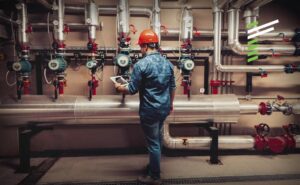Background
The petrochemical industry is a significant contributor to the global economy. Petrochemicals are the building blocks for many of the products we use every day, including plastics, synthetic fibres, rubber, and medicines. Without petrochemicals, many of these products would not exist, or they would be more expensive and less efficient to produce.
Our client is a leading producer of PET sheet and resin, manufacturing packing and bottle grade materials with large-scale production facilities in the Middle East. They developed innovative PET-related products that are challenging the traditional markets for polypropylene, polystyrene, and PVC in terms of performance.
These products are also fully recyclable, and the client has developed processes whereby feedstock in part is made up of recycling material.
The increase in demand for this product has left the company capacity constrained. As a result, management sought to improve current operational efficiency before additional manufacturing capacity came online at a later time. This required a reliability-centred maintenance programme to improve equipment reliability and support production that could meet the increased demand.
Analysis
The three-week analysis phase involved detailed maintenance and operations studies. We wanted to assess what improvements could be made to current processes to deliver the targeted benefits.
The analysis included observational studies, data reviews, SMED (Single Minute Exchange of Dye), Ratio Delays, OEE, debottlenecking opportunities, among others. The analysis concluded with senior management alignment, a project road map, a governance model and detailed management action teams (MATs) designed to deliver the benefits at pace.
Based on the analysis, we discovered that we could significantly improve product changeovers, machine ramp-up and stabilisation times using SMED (Single Minute Exchange of Dye) techniques to drive new standard operating procedures for operators.
Project Approach
We established a steering committee (consisting of senior site management) as well as MATs to foster ownership of the required changes. MATs met weekly to assess progress and agree on remedial actions. A full-time task force (consisting of client staff and supported by our consultants) was responsible for ensuring proper knowledge transfer of the change management techniques and the adequate resourcing of the change programme itself.
The project itself would cover two main workstreams:
WORKSTREAM I: Production
- Objective: Deliver output increase by reducing ramp-down, change-over and ramp-up times.
- Target: 5% OEE increase
- How: Reduce stabilisation times, increase line availability to produce increase in saleable quantity and quality
WORKSTREAM II: Maintenance
- Objective: Implement revised maintenance strategy, use SAP for Maintenance more effectively
- How: Review maintenance organisation and management of spare parts to ensure needs were being met as efficiently as possible
Project Implementation
The 30-week programme was designed to be dynamic and flexible. The joint client-Renoir team were able to implement a rapid design phase and deliver the benefits ahead of schedule. New procedures were designed, tested, refined and then rapidly rolled out across all shifts.
“Not many projects over-deliver ahead of schedule, but to get a 5:1 return on investment and realize 40% more than what was contractually promised — which is worth millions to our bottom line — is a great result!”
CFO
Text BoxDigital dashboards were developed that provided visibility of key production and maintenance KPIs across the site. An overall dashboard showed KPIs for all activities and were reviewed during the revised shift, daily and weekly Management Action Meetings.
As part of improving effective supervision skills in Maintenance, a new manpower planning tool for maintenance was implemented. This allowed monitoring of efficiency daily, and framed discussions of how to increase productivity.
Structured weekly root cause analyses and the subsequent management of actions were supported by training in FMEA, Ishikawa and 5 Whys. Assurance that actions resulted in the required operational impact was achieved through follow-up and formal auditing.
Results
The rapid gains resulted in long-term sustainable results. The production increase was the equivalent of one new production line’s worth of output for 12 months and exceeded the client’s project target by 15% — with the plant eventually achieving 90% OEE for the first time in its 10-year history.
7%
increase in production
$390,000
Maintenance costs reduced
24%
Maintenance labour productivity
13 Weeks
Project payback
By combining our Implementation and Change methodologies with the technical expertise of the taskforce — and conducting significant training sessions to ensure all involved were informed and able to deliver — the project was able to accelerate the delivery of results in a timeframe which was once considered impossible.










